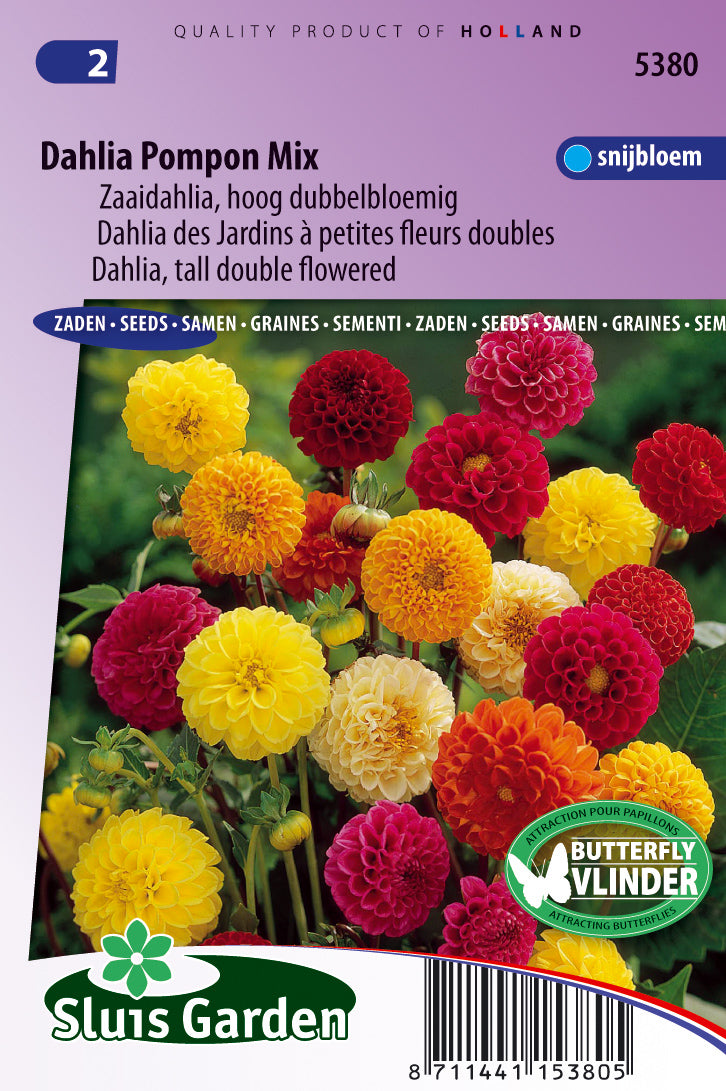1
/
of
1
Dahlia variabilis Pompon Mixed
Dahlia variabilis Pompon Mixed
Regular price
1.350 KWD
Regular price
Sale price
1.350 KWD
Unit price
/
per
Shipping calculated at checkout.
Couldn't load pickup availability
Dahlia variabilis 'Pompon Mixed' is a delightful variety of dahlia known for its small, pom-pom-like flowers in various colors. Here's a guide on how to grow Dahlia variabilis 'Pompon Mixed':
**1. Sunlight:**
- Plant dahlias in a location that receives full sunlight. They thrive in at least 6-8 hours of direct sunlight each day.
**2. Soil:**
- Choose well-draining, fertile soil with a slightly acidic to neutral pH. Dahlias prefer soil enriched with organic matter.
**3. Planting Time:**
- Plant dahlias in the spring after the last frost date. If you're starting from tubers, wait until the soil has warmed up.
**4. Planting Depth:**
- Plant dahlia tubers about 4-6 inches deep. Place them horizontally with the eye or sprout facing upwards.
**5. Spacing:**
- Space dahlia plants according to their mature size. Typically, the spacing should be about 12-18 inches apart.
**6. Watering:**
- Keep the soil consistently moist but not waterlogged. Water at the base of the plants to avoid wetting the foliage. Dahlias generally benefit from deep, infrequent watering.
**7. Mulching:**
- Apply a layer of organic mulch around the dahlias to retain soil moisture, suppress weeds, and regulate soil temperature.
**8. Fertilization:**
- Fertilize dahlias with a balanced, all-purpose fertilizer at planting time and then regularly during the growing season. Follow the package instructions for application rates.
**9. Support:**
- Dahlias may require staking, especially the taller varieties. Install stakes at planting time or once the plants are a few inches tall to avoid damaging the tubers.
**10. Deadheading:**
- Deadhead spent flowers regularly to encourage continuous blooming. Removing faded blooms also directs energy to the production of new flowers.
**11. Pruning:**
- Pinch or prune young dahlia plants to encourage bushiness and more flower production. Remove the top of the main stem to encourage lateral growth.
**12. Overwintering:**
- In colder climates, dig up dahlia tubers after the first frost, and store them in a cool, dry place for the winter. Replant them in the spring after the last frost.
**13. Pests and Diseases:**
- Keep an eye out for pests such as aphids or spider mites. Treat any pest issues promptly. Dahlias are generally susceptible to diseases like powdery mildew, so ensure good air circulation.
**14. Companion Planting:**
- Dahlias 'Pompon Mixed' can be planted alongside other annuals or perennials to create vibrant and visually appealing flower beds.
**15. Organic Certification:**
- If you wish to grow Dahlias 'Pompon Mixed' organically, use organic soil amendments and fertilizers. Follow the guidelines and requirements set by your local organic certification body.
By following these guidelines, you can grow Dahlias variabilis 'Pompon Mixed' and enjoy its charming, pom-pom-like flowers in various colors. Adjustments may be needed based on your local climate and soil conditions.
**1. Sunlight:**
- Plant dahlias in a location that receives full sunlight. They thrive in at least 6-8 hours of direct sunlight each day.
**2. Soil:**
- Choose well-draining, fertile soil with a slightly acidic to neutral pH. Dahlias prefer soil enriched with organic matter.
**3. Planting Time:**
- Plant dahlias in the spring after the last frost date. If you're starting from tubers, wait until the soil has warmed up.
**4. Planting Depth:**
- Plant dahlia tubers about 4-6 inches deep. Place them horizontally with the eye or sprout facing upwards.
**5. Spacing:**
- Space dahlia plants according to their mature size. Typically, the spacing should be about 12-18 inches apart.
**6. Watering:**
- Keep the soil consistently moist but not waterlogged. Water at the base of the plants to avoid wetting the foliage. Dahlias generally benefit from deep, infrequent watering.
**7. Mulching:**
- Apply a layer of organic mulch around the dahlias to retain soil moisture, suppress weeds, and regulate soil temperature.
**8. Fertilization:**
- Fertilize dahlias with a balanced, all-purpose fertilizer at planting time and then regularly during the growing season. Follow the package instructions for application rates.
**9. Support:**
- Dahlias may require staking, especially the taller varieties. Install stakes at planting time or once the plants are a few inches tall to avoid damaging the tubers.
**10. Deadheading:**
- Deadhead spent flowers regularly to encourage continuous blooming. Removing faded blooms also directs energy to the production of new flowers.
**11. Pruning:**
- Pinch or prune young dahlia plants to encourage bushiness and more flower production. Remove the top of the main stem to encourage lateral growth.
**12. Overwintering:**
- In colder climates, dig up dahlia tubers after the first frost, and store them in a cool, dry place for the winter. Replant them in the spring after the last frost.
**13. Pests and Diseases:**
- Keep an eye out for pests such as aphids or spider mites. Treat any pest issues promptly. Dahlias are generally susceptible to diseases like powdery mildew, so ensure good air circulation.
**14. Companion Planting:**
- Dahlias 'Pompon Mixed' can be planted alongside other annuals or perennials to create vibrant and visually appealing flower beds.
**15. Organic Certification:**
- If you wish to grow Dahlias 'Pompon Mixed' organically, use organic soil amendments and fertilizers. Follow the guidelines and requirements set by your local organic certification body.
By following these guidelines, you can grow Dahlias variabilis 'Pompon Mixed' and enjoy its charming, pom-pom-like flowers in various colors. Adjustments may be needed based on your local climate and soil conditions.
Share

